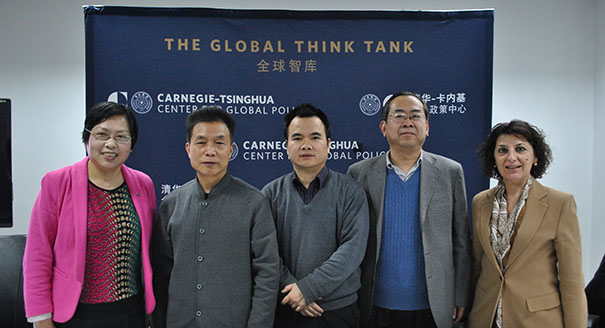Registration
You will receive an email confirming your registration.
Many Chinese and international experts have noted that President Xi Jinping has ushered in a more assertive, proactive foreign policy approach than his predecessors. High-profile initiatives like the Belt and Road make this clear. Yet, core principles of Chinese diplomacy have long been shaped by traditional Chinese cultural concepts that remain relevant today. As President Xi charts China’s foreign policy course in the years ahead, elements of continuity and change will continue to coexist.
Carnegie–Tsinghua’s Zhang Lihua moderated a panel of Chinese and international experts to discuss how Chinese cultural concepts such as harmony and mutual benefit continue to act as a guiding force of China’s foreign policy decisionmaking.
Discussion Highlights
- Lessons From Classical Texts: Panelists agreed that the intellectual underpinnings of China’s diplomatic theory are grounded in Confucian and Daoist concepts, which leads policymakers to treat international relations in a holistic fashion. Scholars asserted that this rich conceptual history makes it difficult to assign the thinking of particular Chinese scholars and practitioners to major Western schools of thought, such as realism, liberalism, or constructivism.
- Balancing National and Moral Interests: Panelists stated that Confucian classics inspire Chinese policymakers to pursue the country’s material interests abroad, while also building enduring mutually beneficial partnerships with other countries. China publicly professes that it is developing stable relations with its neighbors and opposes coercion as a way of settling disputes. Yet one panelist noted that China will need to abide by its stated diplomatic principles of kindness and respect if the country wishes to achieve its goal of establishing a cohesive international community that shares similar visions for the future.
- Integrating Domestic and Foreign Policy: Chinese policymakers view domestic and foreign policy as two sides of the same coin, discussants said, and therefore they do not generally distinguish between the two, instead recognizing that they are interdependent. Panelists asserted that policymakers can do much to address pressing foreign policy issues by first managing China’s internal affairs well. Speakers explained that implementation will be key, saying that artfully carrying out domestic policies will improve the prospects of the country’s foreign policy agenda.
- Common Ground Between East and West: While recognizing the importance of China’s distinctive cultural heritage, panelists agreed that there is a clear need for Chinese scholars to focus on the overlaps between Chinese and Western philosophical traditions. Confucianism, for example, exemplifies the ideal that humanity and nature should coexist harmoniously, a value that also informs Western concerns about climate change and environmental degradation. Speakers suggested that the field of international relations should focus more on finding conceptual links between Eastern and Western thought.
- Promoting Chinese Language and Culture: Participants described the strides that China has made in promoting the worldwide study of Chinese language and culture. Beijing regards its Confucius Institutes as an indispensible tool of public diplomacy and soft power. Yet one panelist observed that China may need to do more to shape its global image, since Chinese cultural traditions are still unfamiliar to many. Speakers stated that foreign nationals returning to their home countries after studying or working in China may help strengthen meaningful cross-cultural interactions.
Zhang Lihua
Zhang Lihua is a resident scholar at the Carnegie–Tsinghua Center for Global Policy where her program at the center examines how China's core values affect Chinese foreign policies.
Ye Zicheng
Ye Zicheng is a professor of political science in the School of International Studies and the director of the China's Center for Strategic Studies at Peking University.
Li Yonghui
Li Yonghui is a professor and the dean of the School of International Relations and Diplomacy at Beijing Foreign Studies University.
Chen Xiangyang
Chen Xiangyang is a research fellow and deputy director of the Institute of World Politics at the China Institutes of Contemporary International Relations.
Elena Avramidou
Elena Avramidou is an associate professor in the Department of History and the Center for Hellenic Studies at Peking University.
